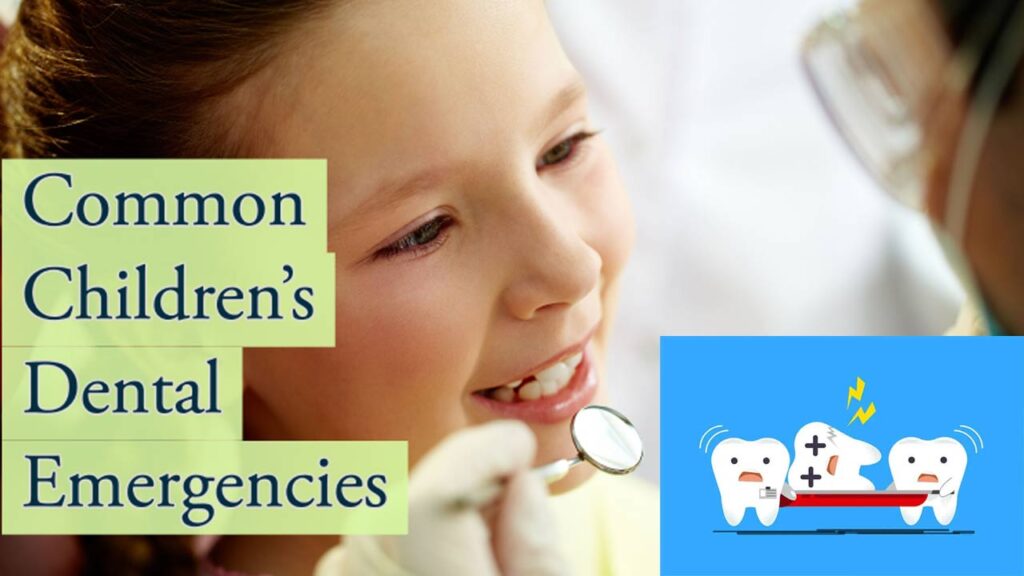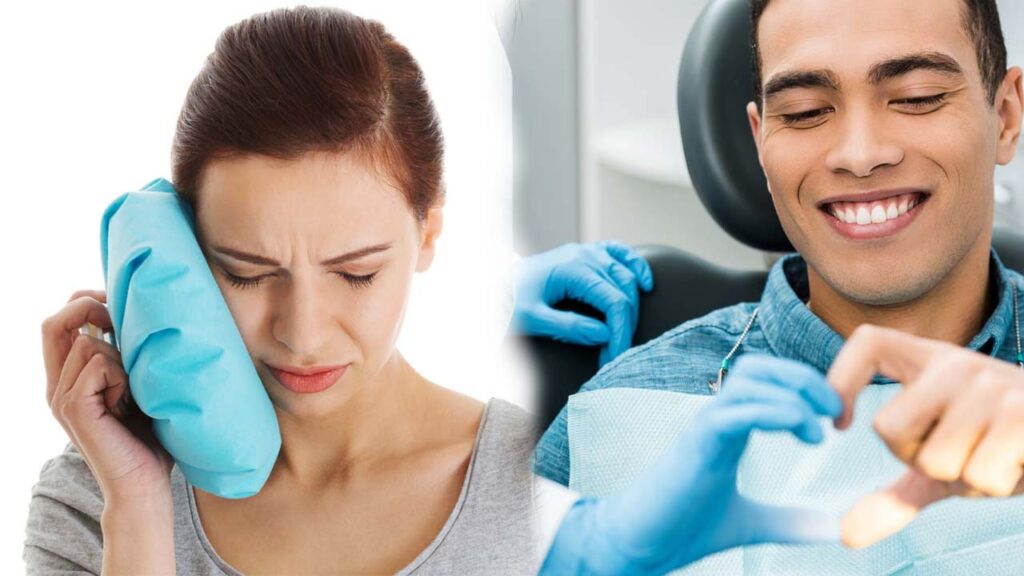Dental emergencies can be painful and disruptive, but it is important to know how to handle them properly to minimize the damage and avoid further complications. This blog will provide a comprehensive guide on how to handle common dental emergencies and when to seek professional help.
Dental emergencies can range from a toothache to a knocked-out tooth and can cause severe pain and discomfort. Prompt treatment is crucial in saving the affected tooth and preventing further damage to the surrounding teeth and gums.
The purpose of this blog is to educate readers on the [importance of dental emergencies and how to handle them properly. It will also answer some frequently asked questions about dental emergencies and provide helpful tips on when to seek professional help.
Common Dental Emergencies

A. Toothache
A toothache is a common dental emergency that can be caused by a variety of factors, such as decay, infection, or injury. The pain can range from mild to severe and can be accompanied by swelling or discharge.
B. Knocked-out tooth
A knocked-out tooth is a serious dental emergency that requires prompt treatment. The chances of saving the tooth depend on how quickly the tooth is re-implanted and the overall health of the patient.
C. Broken or Cracked Tooth
A broken or cracked tooth can be caused by a variety of factors, such as trauma, decay, or grinding. The extent of the damage will determine the course of treatment, but prompt attention is crucial in saving the affected tooth.
D. Lost filling or crown
A lost filling or crown can expose the sensitive inner layer of the tooth to hot and cold temperatures, causing pain and discomfort. The affected tooth should be protected to prevent further damage and infection.
E. Soft tissue injuries
Soft tissue injuries, such as cuts or lacerations to the gums, lips, or tongue, can be painful and bleeding may be profuse. Prompt attention is necessary to stop the bleeding and prevent infection.
How to Handle Dental Emergencies
A. Toothache: steps to relieve pain and prevent further damage
Rinse the mouth with warm salt water.
Apply a cold compress to the outside of the cheek to reduce swelling.
Take over-the-counter pain relievers, such as ibuprofen or acetaminophen, to relieve pain.
Contact your dentist for a prompt evaluation and treatment.
B. Knocked-out tooth: steps to save the tooth
Retrieve the tooth and rinse it gently with water.
Do not remove any attached tissue.
Re-implant the tooth in the socket and hold it in place with your finger.
If the tooth cannot be re-implanted, store it in a container of milk or saliva.
Contact your dentist immediately for a prompt evaluation and treatment.
C. Broken or cracked tooth: steps to prevent further damage
Rinse the mouth with warm salt water.
Apply a cold compress to the outside of the cheek to reduce swelling.
Take over-the-counter pain relievers, such as ibuprofen or acetaminophen, to relieve pain.
Contact your dentist immediately for a prompt evaluation and treatment.
D. Lost filling or crown: steps to protect the tooth
Clean the affected area with warm salt water.
Apply a small amount of dental cement or temporary filling material to the affected tooth.
Avoid eating or drinking anything hot or cold until you can see your dentist.
Contact your dentist immediately for a prompt evaluation and treatment.
E. Soft tissue injuries: steps to stop bleeding and prevent infection
Rinse the affected area with warm salt water.
Apply direct pressure to the area using a clean cloth or gauze.
If the bleeding does not stop, seek immediate medical attention.
Contact your dentist for a follow-up evaluation and treatment.
When to Seek Professional Help
A. Signs of an infected tooth
Signs of an infected tooth include severe pain, swelling, discharge, and fever. If you experience any of these symptoms, it is important to seek professional help as soon as possible.
B. When to see a dentist for a dental emergency
In case of a dental emergency, it is important to seek professional help as soon as possible. The sooner you see a dentist, the better the chances of saving the affected tooth and preventing further damage.
C. Importance of prompt treatment
Prompt treatment is crucial in saving the affected tooth and preventing further damage to the surrounding teeth and gums. It is also important to seek professional help to minimize the risk of infection and ensure a quick and effective recovery.
healthcareDental health is an important aspect of overall health and well-being. Take control of your dental health with our top-quality dental health care products. Say goodbye to painful and inconvenient dental issues and hello to a brighter, healthier smile.
These products are designed with the latest technology and are made from premium materials, ensuring that you get the best results. Whether you’re looking for a solution for sensitive teeth, gum health, or just want to keep your smile sparkling, our dental health care products have got you covered.
Tired of hiding your smile due to yellowing, stained, or sensitive teeth?
ProDentim is here to help. This advanced formula whitens and strengthens your teeth, while also reducing sensitivity and promoting oral health. Say goodbye to expensive and painful dental treatments, and start enjoying a bright, confident smile with ProDentim.
Click Here to Try ProDentim now and see the results for yourself!
Struggling with tooth sensitivity, gum problems or bad breath?
Dentitox Pro is the solution you need. This natural, effective formula helps to clean and strengthen your teeth and gums, giving you a brighter, healthier smile. Dentitox Pro is made with the finest ingredients and is free from harmful chemicals, making it safe and gentle for everyday use. Say goodbye to pain and embarrassment, and start enjoying a confident, beautiful smile with Dentitox Pro.
Click Here to Order now and get 20% off your first purchase!
Click Here for Professional Teeth Whitening
Frequently Asked Questions (FAQs) About the Importance of Dental Emergencies and How to Handle Them
A. What should I do if I have a toothache?
If you have a toothache, rinse your mouth with warm salt water, apply a cold compress to the outside of the cheek to reduce swelling, and take over-the-counter pain relievers, such as ibuprofen or acetaminophen. Contact your dentist immediately for a prompt evaluation and treatment.
B. How can I save a knocked-out tooth?
To save a knocked-out tooth, retrieve the tooth and rinse it gently with water. Do not remove any attached tissue. Re-implant the tooth in the socket and hold it in place with your finger. If the tooth cannot be re-implanted, store it in a container of milk or saliva. Contact your dentist immediately for a prompt evaluation and treatment.
C. How can I prevent further damage to a broken or cracked tooth?
To prevent further damage to a broken or cracked tooth, rinse your mouth with warm salt water, apply a cold compress to the outside of the cheek to reduce swelling, and take over-the-counter pain relievers, such as ibuprofen or acetaminophen. Contact your dentist immediately for a prompt evaluation and treatment.
D. What should I do if I have lost a filling or crown?
If you have lost a filling or crown, clean the affected area with warm salt water, apply a small amount of dental cement or temporary filling material to the affected tooth, and avoid eating or drinking anything hot or cold until you can see your dentist. Contact your dentist immediately for a prompt evaluation and treatment.
E. How can I stop bleeding from a soft tissue injury?
To stop bleeding from a soft tissue injury, rinse the affected area with warm salt water, apply direct pressure to the area using a clean cloth or gauze, and seek immediate medical attention if the bleeding does not stop. Contact your dentist for a follow-up evaluation and treatment.
Dental emergencies can range from a toothache to a knocked-out tooth and can cause severe pain and discomfort. Prompt treatment is crucial in saving the affected tooth and preventing further damage to the surrounding teeth and gums.
In case of a dental emergency, it is important to know how to handle it properly and seek professional help as soon as possible. Remember to rinse the affected area with warm salt water, apply pressure or a cold compress, and avoid eating or drinking hot or cold items. Contact your dentist immediately for a prompt evaluation and treatment. Taking proper care of your dental health and seeking prompt treatment for emergencies can ensure a quick and effective recovery.


1 thought on “The Importance of Dental Emergencies and How to Handle Them”